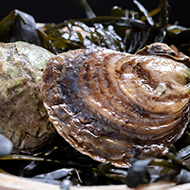New insights into oyster DNA revealed

"Our results could contribute to sustainable food production" - Dr Tim Bean.
Researchers from the Roslin Institute have discovered insights into the DNA of European flat oysters that could help to produce larger and healthier shellfish.
The researchers developed genetic resources detailing the DNA of oysters, and then used this to consider and address the challenges that the species face.
In order to fully understand the genetics information in the study, the scientists decoded the complete DNA code of the European flat oyster.
Analysing the genome of the oyster, the researchers found that two areas of the oyster genome are significantly associated with faster growth, and concluded that it would be feasible to genetically improve growth traits in oysters.
Incorporating the genomic information into breeding schemes could be a cost-effective way to enhance weight, shell size and other growth traits in the species.
Dr Tim Bean, of the Roslin Institute, explained: “Oysters were once a plentiful source of food and a mainstay of the Scottish people, but have long been in decline.
“Our studies, in collaboration with UK and European academics, industry, environmental charities, and government scientists, used genomics and genetic tools to help inform breeding strategies of the native European flat oyster.
“Our results could contribute to sustainable food production, as oysters have among the lowest environmental impact of any animal protein production.”
The study 'Genome-Wide Association and Genomic Prediction of Growth Traits in the European Flat Oyster' is published in Frontiers.
A separate study led by scientists from the University of Santiago de Compostela, which involved members of the Roslin team, found that variations in a region of oyster DNA may be associated with tolerance to Bonamia Ostreae, a deadly parasite.
This study is published in Evolutionary Applications.



 HMRC has invited feedback to its communications regarding the employment status of locum vets and vet nurses.
HMRC has invited feedback to its communications regarding the employment status of locum vets and vet nurses.